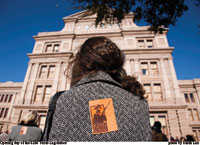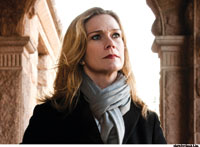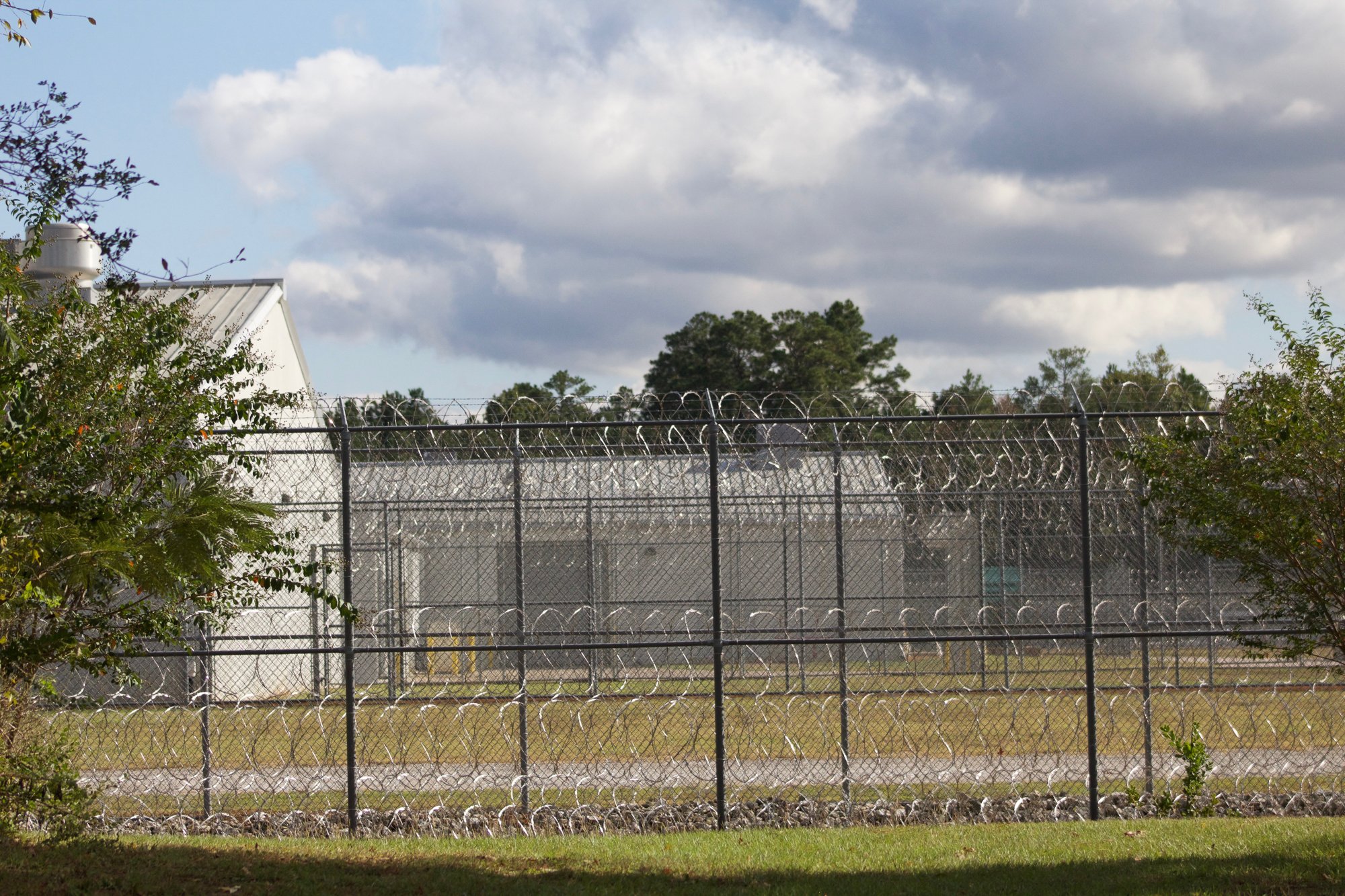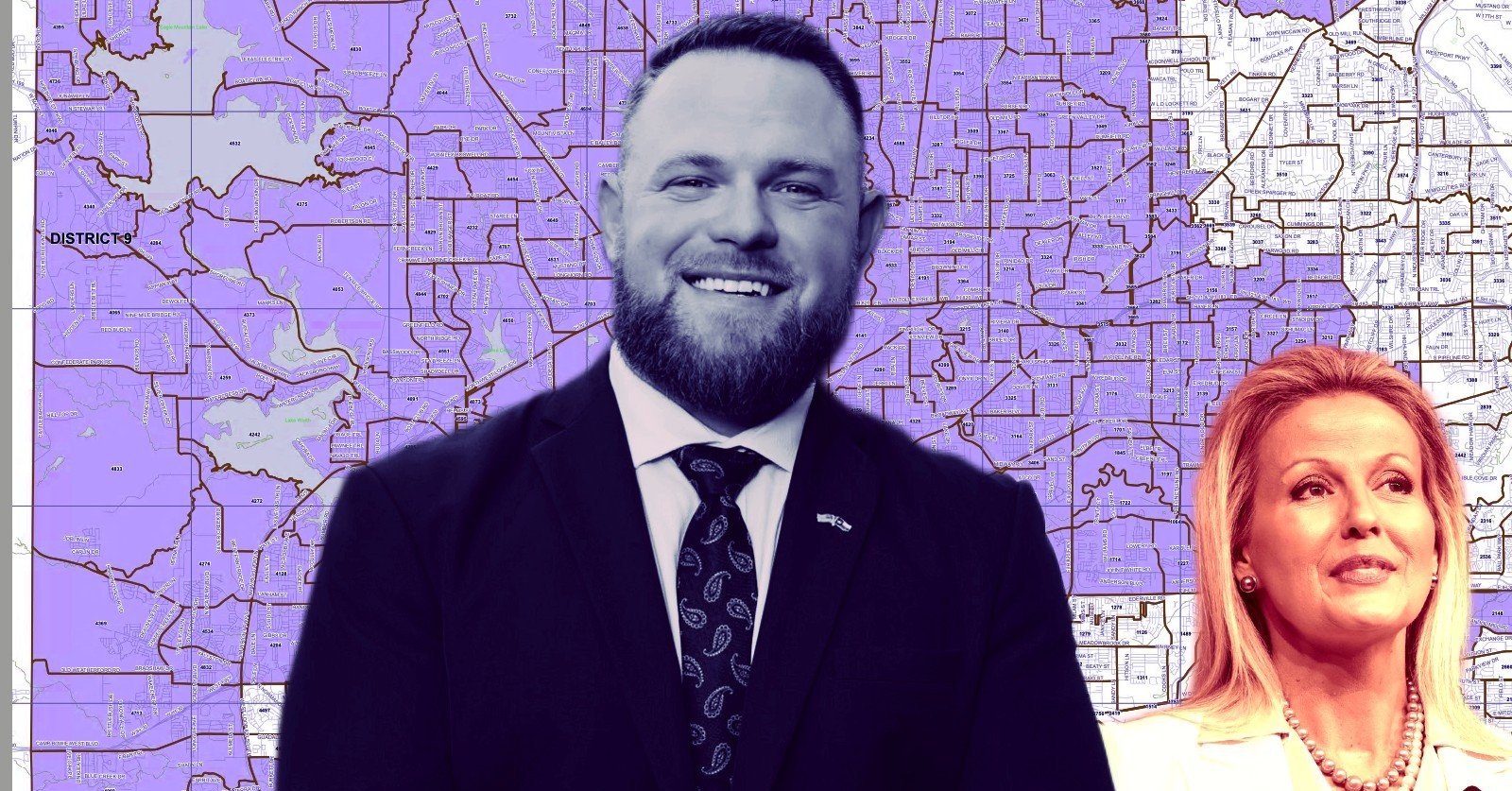The Queen of King Street
What do Catherine Engelbrecht and her notorious Houston "patriots" really want?
On opening day of the 82nd Texas Legislature, Catherine Engelbrecht stood in the shade of a live oak near the south steps of the Capitol watching a crowd gather for the afternoon Tea Party rally. Compared with those around her, many clad in stars and stripes, Engelbrecht looked elegantly out of place in her full-length, black wool coat and gray scarf. Her blond hair and aviator sunglasses gave her the air of an aging Hollywood bombshell.
She remained silent as former state Rep. Rick Green, a Tea Party favorite for his promotion of a Christianized version of American history, fired up the crowd. The Dripping Springs Republican praised “the people” for getting the U.S. Constitution read on the floor of the House of Representatives. It was a victory, Green said, over America’s “massive march to socialism,” a sign that the march was being halted “by a tsunami of red, white and blue.”
Green added, “And everybody here should support the King Street Patriots!” The Tea Partiers roared. Engelbrecht whispered, “Wow, I’m surprised to get a shout-out.”
In 2009, Engelbrecht founded the King Street Patriots, a Tea Party group in Harris County that trained hundreds of volunteer poll-watchers—most of them white, well-off suburbanites like Engelbrecht—to look for voting irregularities, mostly in minority precincts. The group’s efforts to, in their phrase, “True the Vote,” led to fierce battles with progressive get-out-the-vote groups and the New Black Panthers. It also led to lawsuits, investigations, complaints and a national media spotlight. Engelbrecht, with no experience as a political activist, became one of the most recognizable, and controversial, faces in Texas’ loosely defined Tea Party movement. The group’s claims to simply want honest elections was undercut, among other things, by a video—produced in Engelbrecht’s game room—featuring the doctored photo of a black woman holding a sign that reads, “ I only got to vote once!”
The King Street Patriots hit the big time last August when Harris County’s Republican voter registrar, Leo Vasquez, made a startling announcement at a press conference: Based in part on information turned over by Engelbrecht, Vasquez said he had found more than 5,000 invalid voter applications, mostly from heavily minority districts. That figure turned out to be wildly inflated. But the accusations and controversy hurt Houston Votes’ efforts. According to one report, the group was registering 1,000 voters a day before King Street and Leo Vasquez accused the group of fraud; afterward, the number dropped to about 200 a day.
King Street’s collaboration with the ethically challenged Vasquez turned Engelbrecht into a Tea Party celebrity. In October, when Engelbrecht dispatched hundreds of King Street volunteers as poll-watchers in many of the same minority precincts during early voting, she became Texas’ most influential Tea Party organizer. Complaints about voter intimidation by the King Street “watchers” came fast and furious. U.S. Rep. Sheila Jackson Lee, a Houston Democrat and member of the Congressional Black Caucus, asked Justice Department election monitors to come to Houston, which they did.
 For right-wing bloggers and conservative radio hosts, the King Street Patriots became a symbol of the federal government clamping down on a grassroots organization trying to combat voter “fraud.” Engelbrecht was praised as a “true American hero”; Fox News, in one of its frequent interviews with the King Street leader, promoted her as a “soccer mom” turned “voter fraud whistleblower.”
For right-wing bloggers and conservative radio hosts, the King Street Patriots became a symbol of the federal government clamping down on a grassroots organization trying to combat voter “fraud.” Engelbrecht was praised as a “true American hero”; Fox News, in one of its frequent interviews with the King Street leader, promoted her as a “soccer mom” turned “voter fraud whistleblower.”
A week before Election Day, however, Engelbrecht and King Street were hit with a lawsuit from the Texas Democratic Party and an ethics complaint from non-partisan watchdog group Texans for Public Justice. Among other things, King Street was accused of illegally raising money and using it to produce and distribute videos of Republican-only candidate forums held at the King Street offices. Its poll-watchers, the complaint alleged, were recruited “to serve on behalf of the Harris County Republican Party.”
To progressives, King Street was an example not of grassroots power, but of a supposedly independent group acting as a Republican shill. “There’s probably a small percentage of the Tea Party that is a true grassroots movement,” says Chad Dunn, general counsel for the Texas Democratic Party. “The rest is manufactured, paid for by corporations to get their far-right candidates elected.”
By the time the elections were over, Engelbrecht and King Street had been served with a defamation suit and had become the target of an investigation by the Harris County Attorney into King Street volunteers’ activities at the polls.
For many Tea Partiers, the lawsuits and investigations make King Street and Engelbrecht look even more like models of grassroots warfare. Now Engelbrecht aims to spread King Street’s “True the Vote” strategies beyond Harris County. On the Legislature’s opening day, King Street’s orange stickers, featuring the group’s name and the image of a Revolutionary soldier were everywhere. After the Tea Party rally, Engelbrecht met with movement leaders and helped volunteers personally deliver King Street’s 22-point plan to reform the state election code to legislators’ offices.
The lawsuits and investigations won’t slow them down, Engelbrecht says. The right-wing Liberty Institute is representing Engelbrecht and King Street pro bono, and James Bopp, a conservative attorney who worked on Mitt Romney’s 2008 presidential campaign, is helping on the case. “We’ll deal with that,” Engelbrecht says. “But if we don’t keep doing this now, no one will.”
Dunn sees it differently. “The King Street Patriots think for some reason that they don’t have to follow the rules just because they’re the King Street Patriots, and they probably won’t stop until the court steps in and says they have to,” Dunn says. “But I think they’re expecting the court to step in and tell them what they’re doing is right.”

Engelbrecht describes her move into Tea Party activism as a slow drip. She’d always paid attention to politics, she says, but never really cared. When the economy crashed near the end of 2008—and the oil industry took a downturn—her “drip became a little faster.” A lot faster, actually.
Now 41, Engelbrecht was born in Rosenberg, about 30 miles southeast of Houston and just outside Harris County. It was, she says, small-town Texas personified. Her father, an accountant, was active in local politics, serving on the city council, as a judge advocate for the local American Legion and on the hospital and library boards. He inspired Engelbrecht’s small-government, anti-tax view of politics. But he was not a bomb thrower. Engelbrecht remembers words of advice that she has rarely followed: “Don’t get so far out on a limb that, when somebody saws it off, you’re the only one that falls.”
In 1994, Engelbrecht and her husband started a small company, Engelbrecht Manufacturing Inc., to build, design and maintain machinery used to drill oil and gas wells. She served as the company’s president—a title she still holds, though she has “officially stepped away from the daily role of the job.” By 2007, Engelbrecht Manufacturing supported 34 full-time employees. The Engelbrechts bought a couple of acres and built a home in Richmond, a suburb 35 miles southwest of Houston. When their two children entered school, Engelbrecht was elected to the board of the Parent Teacher Organization. Aside from helping start a church in Rosenberg, it was the closest she’d come to political involvement.
The recession changed that. “We came off such a good year in 2007,” Engelbrecht says. “Then there was nothing. Like … nothing. We had no work.” Then came the TARP bailout, “too big to fail” and President Bush’s talk of abandoning “free-market principles to save the free-market system.” President Obama’s election sickened Engelbrecht, she says, as she saw a country “doomed to elect whoever had the best hair or could tell the best joke.”
In February 2009, she was watching CNBC on a computer with her husband when reporter Rick Santelli captured her feelings in his famous rant against the bailouts, delivered from the floor of the Chicago Mercantile Exchange. When Santelli concluded, “It’s time for a Tea Party,” Engelbrecht agreed.
Over the next few months, Engelbrecht attended early Tea Party rallies at the Houston Convention Center and a downtown park. When a group calling itself the Houston Tea Party continued meeting after the rallies, Engelbrecht tagged along. She says she soon grew tired of the bickering and power struggles within the group and decided to start her own. Its initial meeting was held in the summer of 2009 at a northwest Houston bar called Sherlock’s. Englebrecht became the picture of a hard-driven activist.
“The economy had fallen through the floor, and I could have been going to work and making customer calls and trying to press on,” Engelbrecht says. “Instead, I would take a shower, get dressed and drive 45 minutes into Houston to work on the King Street project. I’ll never forget the day my husband looked at me and said, ‘Who are you?’”
The 2009 municipal elections in Houston promised fireworks, especially with the headline race between candidates vying to become either the city’s second black or first openly gay mayor. (Annise Parker, a lesbian, won in a runoff.) As always, the city and county were hard up for volunteers to work the polls. Engelbrecht, still unsure of her fledgling group’s purpose, recruited about 30 volunteers. After a few days’ work, they came back from the polls complaining to Engelbrecht that election officials had too much control. A lot of voters, they said, came in and asked poll-watchers questions whom to vote for, or how to vote for particular candidates.
“There were all these conservatives who had always heard” rumors about voting irregularities, says Houston Tea Party activist and former GOP congressional candidate Tom Bazan. When the King Street volunteers “had something to show them, it just caught on like wildfire.”
But it’s not always easy to tell if voters or poll workers are violating the law. For instance, while poll workers cannot suggest one candidate or another, they can—in fact, they must—show voters how to vote and help cast a ballot if the voters need help writing or understanding the ballot. Similarly, voters can bring someone with them into the voting booth if they need help—another complaint of the King Street volunteers. From a distance, such actions can look devious, as though someone is manipulating the system. But such measures are meant to help maximize access.
King Street now had its mission and its name—after the original group that protested “confiscatory” taxes in colonial Boston. Engelbrecht rented meeting space in a retail strip in northwest Houston. She registered King Street as a nonprofit and named herself president. It’s the only official title in the group. King Street doesn’t have official memberships, either, just volunteers who show up and donate cash. As the 2010 elections grew closer, its weekly meetings averaged about 150 people.
The project that launched King Street and Engelbrecht into the national spotlight started when she heard about Houston Votes, a project of Texans Together Education Fund, which registers voters in neighborhoods with historically low turnout and large minority concentrations. Engelbrecht had tried a registration drive with King Street, but she’d found it tough going, signing up a few hundred people in a month. How, she wondered, was Houston Votes signing up thousands?
Engelbrecht secured a list of registered voters in Harris County and had King Street volunteers cross-check names registered by Houston Votes with death records, property records and even satellite images on Google Maps. The results led her to allege that many of the voter applications were inaccurate.
The same month, the King Street Patriots hosted J. Christian Adams, an attorney who says he quit his post at the U.S. Department of Justice because it wouldn’t prosecute the New Black Panthers who allegedly stood outside a Philadelphia polling station in 2008, brandishing billy clubs and intimidating voters. During a conversation about the New Black Panthers, recorded and posted on King Street’s slick website, Engelbrecht said that Fred Lewis, president of Texans Together and a longtime progressive activist, was controlled by a “radical, racist, criminal hate group”—the New Black Panthers of Houston. The video would lead to a defamation suit filed by Lewis against Engelbrecht. The suit alleges that the King Street president intentionally lied to “destroy Lewis and Texans Together.”
Contacted by the Observer, Lewis would not say much about King Street or Engelbrecht because the suit is pending. He referred us to his attorney, Jim George, who did not respond to calls.
Engelbrecht won’t talk about Lewis or the lawsuit, either, except to say: “I’d seen people in the news before getting sued again and again, and I’d think, ‘They must really be bad characters.’ The whole experience is still surreal.”
Things must have felt really strange when, less than a month later, the Texas Democratic Party filed its lawsuit, which raised serious questions about how much money Engelbrecht had raised, and from whom. The complaint says that King Street’s “corporate contributions collectively appear to be worth tens, if not hundreds of thousands of dollars.” The ethics complaint from Texans for Public Justice, filed almost simultaneously, alleged that King Street had received a $2,500 donation from the Houston Association of Insurance Agents.
Nonprofit corporations in Texas, like King Street Patriots, don’t have to list their funders, but they may not participate in partisan activity. To support a party or a candidate, they must create a political action committee, known as a PAC; PACs can be political actors but they also must list their donors. According to TPJ, King Street Patriots and its “True the Vote” effort amounts to political action by a nonprofit corporation. If true, that would make the group’s actions equivalent to political donations from a corporation. That also would make them illegal under Texas law.
“They could talk generally about voter fraud,” Craig McDonald, spokesperson for TPJ, told the Observer. “When they start to recruit people and volunteers to do something about it through the political parties, then it becomes illegal.”
After the suits, Engelbrecht released King Street’s financial information to the public. On Oct. 28, four days before the election, King Street’s lawyers from the right-wing Liberty Institute—who did not return calls for comment—announced that Engelbrecht had raised about $87,000 in a little over a year. They said the money came exclusively from hat-passing at King Street meetings—a literal hat, black felt cowboy, that goes around church-style at the end of every gathering.
“It strains belief that this group raised that amount of money by passing the hat at their meetings,” wrote Chad Dunn, the Texas Democrats’ general counsel, in a press release. He later told the Observer, “We don’t know how much more money she’s raised, but my guess is they have a large donor. I’d be willing to bet it’s someone from business or insurance or any of the regular ATM lines to the Republican Party.”
Engelbrecht denies it. She says the hat remains the primary method for raising cash, tho
gh she adds, “We have had a few indiv
duals write us checks.” Engelbrecht says she also put in her own cash to keep King Street running early on. But she’s not saying how much they’ve raised beyond the $87,000 announced in late October. “I’d prefer not to give a specific number,” she says. “Last time we did that, we got torn to shreds.”
With Election Day approaching and controversy swirling around King Street, Houston’s New Black Panthers leader, Quanell X, upped the ante, telling a TV reporter he would be at the polls watching King Street’s watchers. He promised that he and the Panthers—a small but vocal group in Houston—would not carry billy clubs or nightsticks. But, he said, “We will not tolerate any intimidation tactics coming from them against our elderly, our women and our young people.”
That gave Harris County election officials, who already had Justice Department lawyers monitoring sites where there had been complaints against King Street, a new set of worries. “We had never seen anything like this before,” says Douglas Ray. “Nothing remotely like this.”
Even before King Street stirred the waters, Harris County appeared headed for chaos on Election Day. On Aug. 27, about 50 days before the start of early voting, a massive fire ripped through a warehouse on Houston’s north side and wiped out close to 10,000 voting machines. “It was devastating,” says Terry O’Rourke, a first assistant in the office of the Harris County Attorney.
King Street’s volunteer army was hardly helping matters, O’Rourke says. “Without the voting machines, it slows down the process. We have people,” he says, referring to citizens in minority precincts, “who know people literally died for their right to vote. These people know that even slowing down the process can change the outcome of an election. That’s not good, and they know it.
“So when you have a group of upper-class white people dealing with the mechanisms of an election for the first time, coming into minority districts, you can imagine the problems it causes,” O’Rourke says.
Nobody had to imagine for long. King Street volunteers arrived at the polls on Monday, Oct. 18, the first day of early voting. There were 14 voter intimidation complaints that Monday alone. In one incident, according to the Houston Press, a female poll-watcher stood directly behind a voter and refused to move when asked to by an election judge. “I have the right to stand wherever I want!” the woman reportedly told the judge.
That incident happened at the Kashmere Multi-Service Center, an all-purpose building in Houston’s Kashmere Gardens neighborhood, populated mostly by African Americans. Kashmere is in the 18th Congressional District, served by longtime Democratic representative and King Street arch-villain Sheila Jackson Lee. Lee was being challenged by Republican John Faulk. At King Street meetings, volunteers often wore round, red-and-white stickers featuring the initials “SJL” with a line slashed through them. Faulk’s campaign headquarters sat next to King Street’s. Many of the voter-intimidation reports, it turns out, came from the 18th District.
Election officials had a hard time responding. “It was difficult to do anything about the King Street Patriots,” says O’Rourke, “because it’s not like they were running around wearing signs that said ‘King Street Patriots.’ They were registered as Republican poll-watchers, so they were more or less an arm of the Republican Party.”
An active arm, judging by the 56 complaints ultimately filed against them. Investigators, Ray says, “didn’t find any definitive evidence of any violation of law.” The complaints were handed over to the Harris County District Attorney’s office. The investigation remains open.
While others complained about their tactics, the King Street Patriots were busy looking for problems while they watched the polls. The group filed more than 700 complaints about voting “irregularities,” covering all but one of Harris County’s precincts. Four of the complaints were allegations of assault, including a 65-year-old King Street volunteer who says she was yanked by the arm when she wouldn’t leave a polling location.
The King Street-New Black Panthers showdown never materialized. Engelbrecht holed up in her offices on Election Day, fielding phone calls and reports from the polls. That night Republicans made gains in majority-Democratic Harris County and swept the statewide elections. The King Street Patriots celebrated in style with a party in the Crystal Ballroom of downtown Houston’s ritzy Post Rice Lofts. Engelbrecht kept the faithful waiting a while as rumors buzzed about a confrontation with the New Black Panthers. She finally entered the ballroom to a standing ovation and declared victory.
“The nation is ready for something like this,” Engelbrecht said to a packed house at the King Street offices on the Monday night after the elections. “We’re here for the long term.”
Engelbrecht was already getting folks fired up for the next election. She told them that because the losing Democratic candidate for governor, former Houston Mayor Bill White, had carried Harris County, state election code dictates that Democrats will control the polls during the county’s municipal elections this year.
“Y’all think we should just trust the Democrats at the polls to do the job right?” she asked.
“No!” the crowd yelled.
“Y’all think they’re going to be happy to see us at the polls?” she asked.
“No!”
“Do we have time to sit around and pat ourselves on the back?”
“No!”
Engelbrecht’s vision for King Street, even for the immediate future, stretches beyond Harris County. The group’s impressive turnout on day one of the Legislature, when some 200 patriots came on buses from Houston, signaled its intention to push election-reform legislation. Item No. 1 on King Street’s 22-point plan—mandating that every voter show ID at the polls—has long been a priority for Republicans, and appears headed for easy passage after years of ferocious debate.
King Street’s plan also proposes to remove the names of the deceased and felons from voter registries at “standardized intervals.” It calls on the state to “Designate English as the official language of Texas and the only language used on ballots.” And while the group wants voter identification, it also wants laws guaranteeing the “confidentiality of identity and personal information of a Poll Watcher,” with “penalties on any election officer who discloses such.” That idea is particularly important to Engelbrecht. In 2010, she put up security cameras around her home after an anonymous website posted the address and pictures of her Richmond home and business.
While King Street deals with litigation and works to extend its influence to the Capitol, Engelbrecht is trying to capitalize on the publicity by making the Houston activists models for other Tea Party groups. On Jan. 15, the Saturday after King Street came to Austin, Engelbrecht hosted a “statewide summit” at a Houston hotel. About 80 Tea Partiers showed up representing 14 counties in Texas, Washington, D.C., and four states: California, New Jersey, North Carolina and Florida.
The aim is to turn other Tea Party groups into organizations like King Street that can affect local elections. With municipal elections this year, Engelbrecht says it’s time for King Street to hit the road and teach its methods to others.
“If each of our groups could focus on one guy, one candidate, then it could actually mean something because we could collectively cover the terrain,” Engelbrecht says. “But I don’t know. If I get this wrong, I get this wrong. It’s not like I ever said I expected to get it right.”
Paul Knight, a former staff writer for the Houston Press, is a freelance writer living in Austin.


